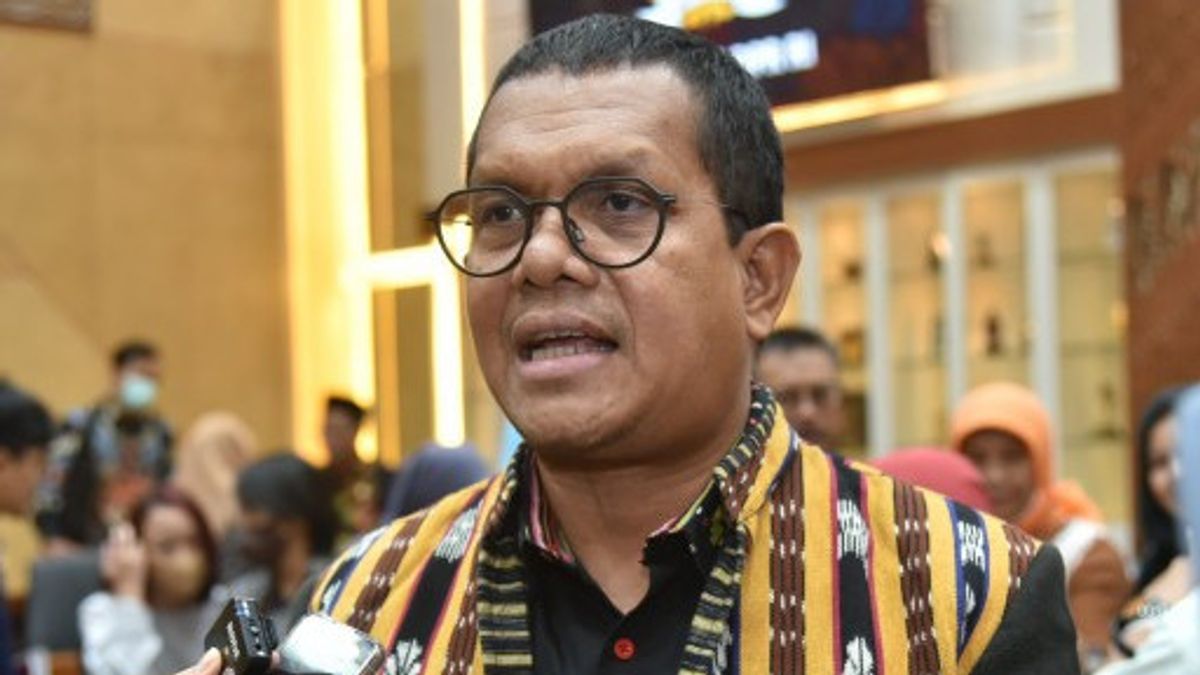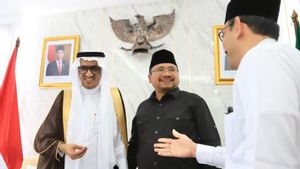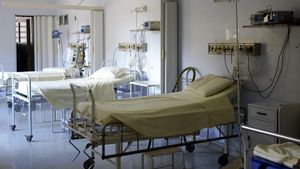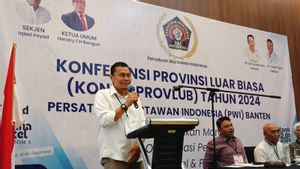Chairman of the Working Committee (Panja) of the Health Bill, Emanuel Melkiades Laka Lena, said that the discussion of the Health Law was carried out intensively and comprehensively by prioritizing the urgency of strengthening the national health system.
"Through a comprehensive health transformation to increase the health status of the Indonesian people and increase the nation's competitiveness in the eyes of the international community," said Melkiades when reading the report of the Panja for the Health Bill at the DPR Plenary Meeting at the Nusantara II Building, Parliament Complex, Senayan, Jakarta, Tuesday 11 July.
The man who is familiarly called Melki added that the use of the Omnibus Law method was chosen to facilitate the implementation of the Health Law in the community. Because, currently there are still overlapping regulations that often make it difficult for the public to obtain health services.
Through the omnibus law, the Health Law will remove several existing laws and regulations as well as establish several new regulations. The Health Law is also present to answer various problems in the health sector.
Starting from health services that are still dominated by curative approaches, the availability and distribution of Health Resources (HR), readiness to face health crises, aspects of pharmaceutical independence and medical devices, aspects of financing, and the use of health technology.
Melki explained that the discussion of the Health Bill was then agreed upon through the formation of a Working Committee (Panja). Even the working meeting of the DPR Panja with the Government was also held during a recess to optimize the time for discussing the Health Bill.
"For maximum use of time, the Panja Bill on Health has also submitted a request for a meeting permit during the fourth trial recess for the 2022-2023 Session Year, both inside the Building and outside the DPR RI, to the leadership of the DPR RI," said Melki.
VOIR éGALEMENT:
The deputy chairman of Commission IX of the DPR understands the rejection of a number of circles towards the Health Law. Even so, Melki emphasized that the discussion of the Health Law was carried out in accordance with the applicable mechanisms, including by absorbing public aspirations, especially with health workers and various other elements of society related to the health sector.
"In order to maintain meaningful openness and participation from the community, the Panja has carried out stages of public consultation and hearings on the sidelines of the Panja discussion based on a letter requesting public audience which has been received by Commission IX of the DPR RI," he said.
One example of an audience conducted by the Panja for the Health Bill is such as a joint meeting with several hospital associations. Among them are the Management of the Association of Indonesian Hospitals (PERSI), the Management of the Indonesian Vertical Hospital Association (ARVI), the Management of the Regional Hospital Association (ARSADA), the Management of the Association of Indonesian Private Hospitals (ARSSI) and the Management of the Indonesian Clinical Association and Health Service Facilities (PKFI).
In addition, the Working Committee for the Health Bill also held hearings with a number of health worker associations (Nakes). Such as the Management of the Indonesian Midwives Association (IBI), the Management of the Indonesian National Nurses Association (PPNI), the Management of the Indonesian Doctors Association (IDI), the Management of the Indonesian Doctors Association (PDSI), the Association of Indonesian Community Health Nutritionists and the Management of the Association of Indonesian Pharmaceutical Experts (PAFI).
Not only the DPR, the Government has also conducted socialization about the Health Bill as a form of public participation involvement. There are at least 79 public participation activities held by the Government by involving relevant ministries/agencies, Professional Organizations, Academics, NGOs and Associations.
"Audiences are carried out to absorb aspirations in order to create health services that are friendly to the community," explained Melki.
After going through a dynamic discussion at the Panja which was followed by discussions by the Perumus Team and the Synchronization Team (Timus and Timsin), the Health Law contained regulations consisting of 20 Chapters and 458 Articles. Melki ensured that the discussion of the Health Law had fulfilled the elements of openness and was carried out for the sake of improving the health system in the country.
"This RUU contains the substance that supports the implementation of the transformation of the Health system," said the legislator from the East Nusa Tenggara (NTT) II electoral district.
Melki said the Health Law is an important comprehensive regulation in the health sector. This law describes a reformist and ambitious health transformation agenda for efforts to improve health services at the first level (puskesmas and primary clinics) and secondary (hospitals).
"This improvement is through strengthening the implementation of health efforts in the form of promotive, preventive, curative, rehabilitative, and/or palliative forms, equitable distribution of health care facilities, provision of medical personnel and health workers through increasing the implementation of specialist/subspecialist education, transparency in the process of registration and licensing," said Melki.
The new Health Law also accommodates the improvement of health services related to the mechanism for receiving medical personnel and health workers Indonesian citizens who graduated abroad to take transparent competency tests, as well as the use of health technology including biomedical technology for the benefit of science and health technology.
Furthermore, the Health Law also regulates Health Services towards precision medical services (precision medicine), strengthening Health Information Systems, strengthening health emergencies, providing exosystem space for the development of health innovations, and strengthening health funding.
"Meanwhile, the Regional Government has allocated a Health budget from the APBD in accordance with regional health needs which refers to the national Health program as outlined in the master plan for the Health Sector (RIBK) by paying attention to performance-based budgeting," he continued.
Melki explained, the allocation of the health budget includes paying attention to the resolution of health problems based on the burden of disease or epidemiology. In the context of efforts to increase the kineria of health funding, the Central Government can also provide incentives or disincentives to the local government in accordance with the performance achievements of health programs and services that are prioritized by the Central Government.
"We are also monitoring health funding nationally and regionally to ensure the achievement of health funding goals through a Health funding information system that is integrated with the National Health Information System," explained Melki.
This Health Law also regulates the implementation of health efforts where the involvement of the responsibility of the Regional Government and the Central Government must be harmonized. Melki added that the Health Law also mandates the protection of medical personnel and health workers.
"Especially those on duty in disadvantaged areas, borders, and islands as well as health or regional problems are not in demand by obtaining special allowances or incentives, security guarantees, infrastructure support and medical devices," he explained.
"As well as extraordinary promotions, and protection in carrying out tasks in accordance with the provisions of the legislation," added Melki.
The Health Law also mandates the provision of legal protection to medical personnel and health workers when carrying out practice. Health workers and medical personnel are entitled to legal protection as long as carrying out their duties in accordance with professional standards and ethics, as well as the patient's health needs.
"In addition, medical personnel and health workers also receive protection for safety, occupational health and security," he said.
On the other hand, the Health Law also regulates medical education, Konsil, Kolegium, Professional Organization, and the Honorary Council of Medical Discipline. This Health Law is certain to have undergone a fairly long discussion by involving all stakeholders from various perspectives.
"As in the future specialist medical education can be held by hospitals, especially government-owned hospitals," said Melki.
This new Health Law also provides convenience for health care providers. One of them is regarding Registration Certificates for medical personnel and health workers which will be applied for life as well as convenience and simplification in the processing of practice permits.
"In the end, discussions and all arrangements in the Bill on Health were carried out solely to promote the health of the Indonesian people both in normal times and in times of crisis," said Melki.
The English, Chinese, Japanese, Arabic, and French versions are automatically generated by the AI. So there may still be inaccuracies in translating, please always see Indonesian as our main language. (system supported by DigitalSiber.id)

















